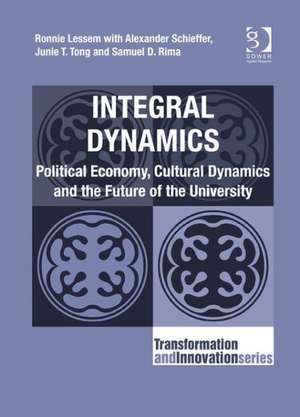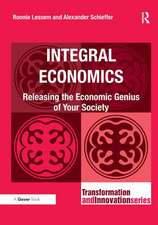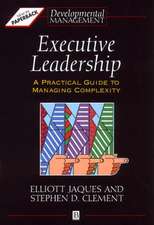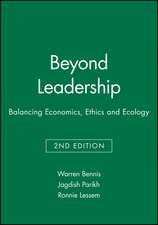Integral Dynamics: Political Economy, Cultural Dynamics and the Future of the University: Transformation and Innovation
Autor Ronnie Lessem, Alexander Schieffer, Samuel D. Rimaen Limba Engleză Hardback – 11 mar 2013
Din seria Transformation and Innovation
-
 Preț: 477.39 lei
Preț: 477.39 lei - 13%
 Preț: 338.33 lei
Preț: 338.33 lei -
 Preț: 341.57 lei
Preț: 341.57 lei -
 Preț: 325.93 lei
Preț: 325.93 lei - 12%
 Preț: 342.62 lei
Preț: 342.62 lei - 25%
 Preț: 770.26 lei
Preț: 770.26 lei - 28%
 Preț: 823.57 lei
Preț: 823.57 lei -
 Preț: 485.40 lei
Preț: 485.40 lei - 16%
 Preț: 236.73 lei
Preț: 236.73 lei - 18%
 Preț: 1109.18 lei
Preț: 1109.18 lei - 22%
 Preț: 236.38 lei
Preț: 236.38 lei - 21%
 Preț: 257.49 lei
Preț: 257.49 lei - 30%
 Preț: 773.26 lei
Preț: 773.26 lei - 16%
 Preț: 220.46 lei
Preț: 220.46 lei - 21%
 Preț: 258.09 lei
Preț: 258.09 lei -
 Preț: 469.34 lei
Preț: 469.34 lei - 20%
 Preț: 259.98 lei
Preț: 259.98 lei - 15%
 Preț: 454.50 lei
Preț: 454.50 lei - 25%
 Preț: 855.59 lei
Preț: 855.59 lei - 15%
 Preț: 444.10 lei
Preț: 444.10 lei - 16%
 Preț: 275.88 lei
Preț: 275.88 lei -
 Preț: 385.62 lei
Preț: 385.62 lei - 18%
 Preț: 275.07 lei
Preț: 275.07 lei - 21%
 Preț: 140.10 lei
Preț: 140.10 lei - 15%
 Preț: 456.96 lei
Preț: 456.96 lei -
 Preț: 380.92 lei
Preț: 380.92 lei
Preț: 840.71 lei
Preț vechi: 1152.69 lei
-27% Nou
Puncte Express: 1261
Preț estimativ în valută:
160.89€ • 167.35$ • 132.82£
160.89€ • 167.35$ • 132.82£
Carte tipărită la comandă
Livrare economică 14-28 aprilie
Preluare comenzi: 021 569.72.76
Specificații
ISBN-13: 9781409451037
ISBN-10: 1409451038
Pagini: 648
Dimensiuni: 174 x 246 x 57 mm
Greutate: 1.61 kg
Ediția:New.
Editura: Taylor & Francis
Colecția Routledge
Seria Transformation and Innovation
Locul publicării:Oxford, United Kingdom
ISBN-10: 1409451038
Pagini: 648
Dimensiuni: 174 x 246 x 57 mm
Greutate: 1.61 kg
Ediția:New.
Editura: Taylor & Francis
Colecția Routledge
Seria Transformation and Innovation
Locul publicării:Oxford, United Kingdom
Recenzii
’Our quest for a more sustainable world demands a fundamental re-orientation of higher education. Many valuable books have been published critiquing universities for becoming partners in economic globalization and enabling graduates to accelerate unsustainability. This book takes the crucial next step by offering a compelling and feasible alternative based on connectedness, boundary-crossing, integrative thinking, co-creation and collaborative action. Required reading for anyone interested in creating the university for the future with people, planet and prosperity in mind.’ Arjen Wals, Professor and UNESCO Chair in Social Learning and Sustainable Development and Editor of Learning for Sustainability in Times of Accelerating Change ’As our world struggles to deal with economic collapse, moral decline and spiritual malaise, the authors have developed an approach entitled Integral Dynamics, which challenges the reader to consider how insights from various cultures [trans-cultural] as well as seeking guidance from diverse disciplines [trans-disciplinary] might provide direction for finding viable solutions. Their ideas both critique and challenge historical and prevailing ideas on how to address issues which threaten our current way of life.’ Wilbur P. Stone, Bethel Theological Seminary, St. Paul, MN
Notă biografică
Ronnie Lessem is a co-founder of Trans4m (Geneva), which offers programmes on social and economic transformation and Innovation, in partnership with universities and consultancies. He is also a senior faculty member of Da Vinci Institute in South Africa. His academic career has embraced what is now the University of Zimbabwe, the LSE, and Harvard. Dr Alexander Schieffer gained a Doctorate in Leadership at the University of St Gallen. He is co-editor of the Gower Transformation and Innovation Series with Dr Ronnie Lessem. He is also co-founder of the Geneva-based Trans4m Institute for Integral Innovation. Dr Junie T. Tong is Senior Lecturer in Business Economics at Staffordshire University. She is an ex investment banker and Associate Director of Swiss Bank Corporation International. She spent many years overseas and specialises in interdisciplinary research. Dr Samuel D. Rima is of Native American heritage. Dr Rima has worked in national politics and the Church, and serves as faculty at Bethel Seminary in Minnesota and is the co-founder of the Movement for the Advancement of Spiritual Capital.
Cuprins
I: Orientation; I: Prologue; 1: Integral and Dynamic; II: Integral Dynamics; 2: Transformation; 3: Individuation; 4: Renewal; 5: Innovation; 6: Learning; 7: Acculturation; III: Integral Dynamics; 8: Permaculture; 9: Ntu; 10: Maat; 11: Artel; 12: Wako'da; 13: Ba: Time of Creation (Ba) to Knowledge Union: South-East; 14: TIPS: Technology, Innovation, People, Systems: North-West; IV: Integral Dynamics; 15: Ubuntu – I Am Because You Are; 16: Kyosei – Co-Evolution; 17: Naringsliv – Nourishment of Life; 18: Biomimicry – Imitating Nature; V: Conclusion; 19: Sekem as an Integral Enterprise; 20: Becoming Zimbabwe – An Integral-Dynamic Economy; Epilogue
Descriere
The theory of integral dynamics is based on the view that the development of individual leaders or entrepreneurs requires the simultaneous development of institutions and societies. It seeks a specific way forward for each society, fundamentally different from, but drawing on, its past. Nearly every natural science has been transformed from an analytically-based approach to a dynamic one: now it is time for society and culture to follow suit locally and globally. Each culture, discipline and person is incomplete and in need of others in order to develop and evolve. The authors set out a programme for a new integral, trans-cultural and trans-disciplinary area of study, including, but extending beyond, economics and enterprise. It links self with community, enterprise and society, and focusing on the vital relationship between local identity and global integrity. Illustrated with examples relating the conceptual to the practical, this is a text for our trans-modern age.












